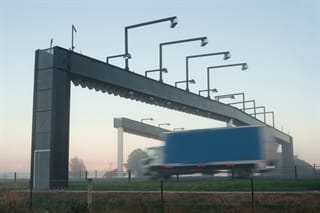Wisconsin’s highways are seriously underfunded. According to the Wisconsin Department of Transportation’s Transportation Fund Solvency report, spending only the $28 billion projected to be available over the next decade will lead to double the number of highway miles in “poor” condition — and will preclude even planning any highway expansions for nearly 40 years. Borrowing enough to spend $31 billion would slightly reduce the amount of “poor” highway miles but still would preclude planning any highway expansions until 2040.
But a second WisDOT report offers a way out. Extensive research done last year for the DOT by the consulting firm HNTB, at the 2015 Legislature’s request, analyzed the feasibility of using toll finance to rebuild and modernize the state’s Interstate highways. Many of these vitally important corridors are nearing the end of their 50-year design life and need to be rebuilt.
A 2011 study that I carried out for the Wisconsin Policy Research Institute estimated that rebuilding and selectively widening all of these urban and rural Interstates would cost $26 billion (in 2010 dollars). If those projects could be financed by toll revenue over the next 20 years, that would free up existing federal and state gas tax dollars to address the shortfall in the rest of the highway system.
The HNTB study did not address the cost of rebuilding the Interstates, but it did make conservative estimates of how much toll revenue could be raised from users of the improved corridors, using all-electronic toll collection (no toll booths or plazas). The study’s mid-range revenue estimate was $29 billion over 30 years at an average passenger car toll of 8 cents per mile. (Tolls might start at 5 cents per mile and be increased annually by the rate of inflation.) Since my $26 billion estimate was in 2010 dollars, the cost might be a bit higher than the projected revenue of $29 billion, due to construction cost inflation since 2010.
Federal law still bans most forms of Interstate tolling. There are only two possibilities available to Wisconsin, as the HNTB report explained. One is a federal pilot program that allows three states to each rebuild and modernize one Interstate, using bonds backed by toll revenue. The other is a road pricing program that allows a congested Interstate to implement variable tolling to reduce congestion. But those toll revenues also could be bonded, to pay for reconstruction and widening (for example, to restart the I-94 East-West project that is now on hold).
Both federal programs have only a few openings. The three-state pilot program has two open slots, because two former slot-holders didn’t make use of them by the deadline that Congress set. Missouri continues to hold its slot, aiming to use toll financing to reconstruct aging I-70 with the addition of dedicated truck lanes.
Both houses of Indiana’s legislature have passed bills that would authorize their governor to apply for one of those two slots. There is serious legislative interest in Connecticut and tolling talk in several other states, including Massachusetts and Rhode Island. If the Wisconsin Legislature fails to act this session, the remaining two slots may be taken this year.
As for the federal Value Pricing Program, it’s a membership program for states that wish to implement variable tolling (having the toll vary with the level of traffic, like a market price, to keep traffic free-flowing). The program also has only two slots available. Only states that are members are eligible to implement variable tolling on a congested urban Interstate. Connecticut and Illinois are both members; Wisconsin is not. That, too, is an opportunity that might not exist by next year’s legislative session.
The Legislature need not decide this session that Interstate tolling is the way to go. But if toll-financed Interstate reconstruction is a serious possibility after further study and debate, Wisconsin’s applying to one or both of these federal programs this spring can be seen as an insurance policy. The HNTB study is more comprehensive and detailed than anything Indiana has done, so an application from Wisconsin is likely to be taken seriously by the Federal Highway Administration.
Tolls are not everyone’s cup of tea, but thanks to its robust tolling program for major highways, Illinois is moving ahead with widening and reconstruction projects comparable to those that are stalled in Wisconsin. High-quality infrastructure is a key factor in business location decisions and economic competitiveness. Wisconsin needs to solve its highway funding shortfall, and toll-financed Interstate modernization is a powerful tool for doing so.
Robert W. Poole Jr. is director of transportation policy at Reason Foundation, which he co-founded in 1978.
Read a previous story by Robert Poole on tolling.





